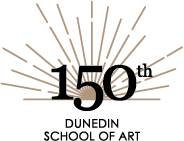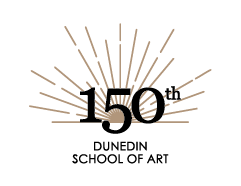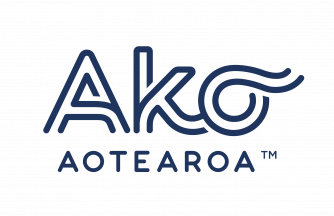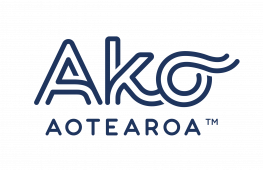Lunchtime Public Seminar Schedule Term 3, 2020 (July 29 2020)
Dunedin School of Art Lunchtime Research Seminars
Schedule Term 3, 2020
THURS 30 JULY, 12.00 – 1.00 PM, P152, DUNEDIN SCHOOL OF ART, RIEGO ST, DUNEDIN
Ed Hanfling
Prince v. Crown: The art and activism of Diane Prince
This seminar examines the work of Diane Prince (Ngāti Whātua, Ngā Puhi), from her involvement in the Bastion Point occupation (1977-78) to her recent raranga judges’ wigs. It focuses on Prince’s penchant for provocation, and her targeting of British legal and political systems, most notoriously in the so-called “flag piece” of 25 years ago, removed from the Auckland Art Gallery Toi o Tāmaki under the threat of legal action. Prince says: “I still see the courtroom as a continual zone of conflict between two ideologically different world views.”
Ed Hanfling is a lecturer in art history and theory at the Dunedin School of Art. He is a regular contributor to the quarterly journal Art New Zealand, has published books on New Zealand artists such as Roy Good, Milan Mrkusich, Ian Scott and Mervyn Williams, and is currently working towards a book on the twentieth-century American painter Morris Louis. Ed occasionally strays from the true path of modernist abstraction.
THURS 6 AUG, 12.00 – 1.00 PM, P152, DUNEDIN SCHOOL OF ART, RIEGO ST, DUNEDIN
Hope Wilson
(Un)conditional: hosting and guesting
The (Un)conditional series was an itinerant exhibition programme initiated by The Physics Room Contemporary Art Space in 2018. The Physics Room partnered with a range of public art galleries across Te Waipounamu including The Suter Art Gallery in Nelson, Ashburton Art Gallery, Aigantighe in Timaru and Eastern Southland Gallery in Gore, to create collaborative exhibitions. The project made it possible to draw on shared strengths and resources and embrace the flexibility and urgency that comes from working alongside, and within, other institutions and contexts. Concepts of hosting, being a guest, trade, exchange, reciprocity and manaakitanga were inherent to the series. This discussion will reflect on the process of exchange central to the (Un)conditional series and some lessons learnt from the collaborative exhibition making process.
Hope Wilson came to Blue Oyster from Eastern Southland Gallery in Gore. Prior to this she was Assistant Curator at The Physics Room in Ōtautahi Christchurch where she supported and developed curatorial projects with a collaborative ethos, including working on the (Un)conditional exhibition series. Hope was a member of the editorial team for the first four issues of HAMSTER magazine, has contributed writing to Art New Zealand and is a sub- editor for Tauhere Connections, a journal for emerging museum professionals. Hope has a background in Art History and English (BA Hons) from the University of Otago and a Postgraduate Diploma in Museum Studies from Massey University.
THURS 13 AUG, 12.00 – 1.00 PM, P152, DUNEDIN SCHOOL OF ART, RIEGO ST, DUNEDIN
Metiria Turei
Indigenous Epistemologies and Artistic Imagination – Barcelona: Reflections on the Indigenous contributions to this conference.
Metiria Turei, supported by the Dunedin School of Art, travelled to present at this conference in Barcelona in 2019 and in this seminar presents her reflections on the contributions to this conference from Indigenous artists from around the globe.
How may a position of marginality become a space of power in our contemporary world? How do indigenous claims to self-representation and cultural production challenge current Western-hegemonic ways of belonging to and looking at the world? This conference aimed to address the recent inclusion of “indigenous thought” in the global art world by seeking to create links between non-Western knowledges, indigenous epistemologies and the artistic imagination
Indigenous situated knowledges are increasingly being recognized as an urgent voice in global debates on natural resources, sustainability, heritage, governance, representation, and social justice. Given the current world situation, in which migration, poverty, discrimination and other social forces are compounded by natural disasters and anthropogenic climate change—dismantling any humanist ideals of peace and prosperity—, indigenous epistemologies have become an alternative for re-thinking what Arjun Appadurai has termed an “emancipatory policy” that could address the asymmetries in the distribution of resources, capital, and power in what is now a clearly destabilizing global landscape.
Metiria Turei (Ngāti Kahungunu, Ati Hau nui a Pāpārangi), a recent graduate from the Dunedin School of Art, is an Indigenous futurist textile artist working and living in Dunedin.
THURS 20 AUG 12.00 – 1.00 PM, P152, DUNEDIN SCHOOL OF ART, RIEGO ST, DUNEDIN
> To be Confirmed
THURS 27 AUG, 12.00 – 1.00 PM, P152, DUNEDIN SCHOOL OF ART, RIEGO ST, DUNEDIN
Octavia Cook
Hi Vis Camou – hunting the abstract in a figurative forest
Hi Vis Camou is the title of an exhibition I had last October at McLeavey Gallery. It describes the two lines my work has taken of late: the series of “eyes” and “skin patches”, which walk the line between obvious and undercover, real and fake, valuable and disposable, public and private.
To wear jewellery (particularly so called “contemporary” jewellery) is to put your private life on display. It could be your true version of yourself or perhaps a trompe l’oeil alter ego – either way, you are inviting the outside world to interact with your body as a vehicle for your jewels. In response, my “eye” pieces return the stare, while the borrowed animal camouflage “skin patches” attempt to distract from the body they cover. Out of their natural figurative context, however, both become somewhat abstracted and ridiculously incapable of doing the job they are meant to do!
While it sounds like a contradiction “Hi vis camou” is well known to deerstalkers – deer apparently can’t see red and orange wavelengths so a camouflage pattern is enough to break up the shape of a hunter’s body, while fellow hunters (in theory) know not to shoot hi vis …
Octavia Cook was born in Auckland but now resides in Port Chalmers, Dunedin. In 1999 Cook graduated with a Bachelor of Design in Jewellery from Auckland’s Unitec, and in 2003 she launched her fictitious family jewellery “company”, Cook & Co. Cook has become known for her hand-crafted cameos constructed from precious metals and acrylic. Her wider oeuvre reveals an encyclopedic concern for the fine art of jewellery. To date Cook’s interest in her craft has spanned the traditional forms, settings and materials of jewellery, as well as its packaging, marketing and provenance. Special attention has been reserved for the value and social function of jewels.
Cook has exhibited her work extensively since 1999. Her work has been shown in exhibitions at Objectspace, City Gallery Wellington, the Suter Art Gallery, the New Dowse, Govett-Brewster Art Gallery, Fingers, Roslyn Oxley 9 and Peter McLeavey. Cook & Co works are represented in public and private collections including those of the Auckland War Memorial Museum, Te Papa Tongarewa, Dowse Art Museum, Middlesborough Institute of Modern Art (UK), Museum of Fine Arts Boston (USA) and the Govett-Brewster Art Gallery.
THURS 3 SEP, 12.00 – 1.00 PM, P152, DUNEDIN SCHOOL OF ART, RIEGO ST, DUNEDIN
Joanna Osborne
Theopoetic dreaming with Joanna Margaret Paul
This seminar presents Joanna Margaret Paul’s multidisciplinary arts practice through the lens of an understated visual and poetic spiritual sensibility. I draw upon the artist’s own frames of reference, mapping convergences between an everyday aesthetics and “religious intuition”. Some methodological considerations that pertain to interdisciplinary study will be briefly outlined, and I conclude with a brief reflection on Paul's practice within wider discussions that pertain to the spiritual in art.
Joanna Osborne, PhD, is the current Creative New Zealand Curatorial Intern at the Dunedin Public Art Gallery. She has an interest in interdisciplinary study within the areas of art history and the histories of religion and theology.
THURS 10 SEP, 12.00 – 1.00 PM, P152, DUNEDIN SCHOOL OF ART, RIEGO ST, DUNEDIN
Peter Cleverley
fourteen pictures with fourteen words
Peter states: “I will show photographs of recent paintings being prepared for exhibitions in Dunedin and Christchurch, October 2020, and discuss some of the influences, techniques, concepts and ideas used to bring them about.”
Peter Cleverley was born in Oamaru (1954) and awarded a Diploma in Fine Arts from the Dunedin School of Art in1974. He has travelled the world: Aotearoa, Australia, Indonesia, Europe, Turkey, Iran, Afghanistan, India, Thailand, Laos, Polynesia, working at anything that would support his art making. Returning to Aotearoa in 1984 Peter has continued paint and exhibit nationally. He worked as the Exhibitions Officer from 1985 – 1997at the Forrester Public Gallery in Oamaru and Lectured in Painting and Drawing at the Dunedin School of Art from 1998 to 2017.
His paintings are held in permanent collections of municipal galleries including Te Papa, the Dunedin Public Art Gallery and the Forrester Gallery. Since 2017 he has worked full-time painting at his studio in Kakanui.
THURS 17 SEP, 12.00 – 1.00 PM, P152, DUNEDIN SCHOOL OF ART, RIEGO ST, DUNEDIN
Tim Barlow
Snake-oil and Carpetbaggers: Can visiting artists be trusted?
“While contemporary art in particular has a large mountain of suspicion to overcome, most cultural gestures must contend with the growing cultural attitude of paranoia” (Nato Thompson from Seeing Power).
As Thompson’s quote suggests there can be complex trust issues to deal with when artists create collaborative, community and participatory art projects. In this seminar, I review some of the community art projects I have worked on in relation to negotiating trust and paranoia, as well as turning these obstacles around to create action and a sense of hope.
Tim Barlow graduated from the Dunedin School of Art in 1994 with a Dip FA Hons. His sculptural work includes installations, moving image, public art and community-based projects. He works at the intersection of themed attractions, film production, architecture, social justice issues and local resource use. Often there is a fun element to his projects such as with The Public Fountain (2012), an interactive geothermal geyser fountain produced for the Taupo Erupt festival. In 2015, he established the Wainuiomata Water festival a water festival staged during times of water restrictions. He recreated Elbe’s Milk Bar (2015) a Lower Hutt milk bar infamous for creating a moral panic in Aotearoa. More recently with Open Source Water-well (2019), he built a shelter that harvested water from air on Waiheke Island.
He has also worked as a prop maker and art director in commercial film production in Aotearoa, UK, and globally. In 2017-2018, he worked alongside Weta Workshop as Head of Content for a new themed museum of Traditional Chinese Medicine in Zhuhai, China. In 2017, he completed a practice-based PhD in Fine Arts from Massey University in Wellington, NZ.
THURS 24 SEP, 12.00 – 1.00 PM, P152, DUNEDIN SCHOOL OF ART, RIEGO ST, DUNEDIN
Joe Citizen
He waka eke noa: Creative arts research as partnership practice
Working in partnership with Wintec’s Māori Achievement Unit, Joe designed, fundraised and project managed the 6.8m tall interactive permanent public art sculpture Tōia Mai, which stands on the banks of the Waikato River at Hamilton’s Ferrybank Reserve. Guided by Waikato-Tainui kaumātua Tame Pokaia and other members of Māori Achievement, this research project saw Wintec students work together from multiple domains in its creation, promotion and storytelling. This two-and-a-half-year journey helped to inform, and was also informed by, Joe’s creative practice-led doctorate in speculative metaphysics at the hyphen in Aotearoa-New Zealand.
Joe Citizen lives in an off-grid hut on the West coast of the Waikato and has been tinkering around and making creative works for most of his life. A collaborative multidisciplinary artist, he has variously been involved with sculpture, performance poetry, mural painting, street theatre, photography, filmmaking, installation work, and immersive interactive works. Although he trained and taught moving image for a number of years, Joe currently works as a lecturer in Hamilton where he teaches across disciplines at Wintec’s School of Media Arts.

 Dunedin School of Art: Lunchtime Research Seminar Programme, Term 2, 2020.
Dunedin School of Art: Lunchtime Research Seminar Programme, Term 2, 2020.

